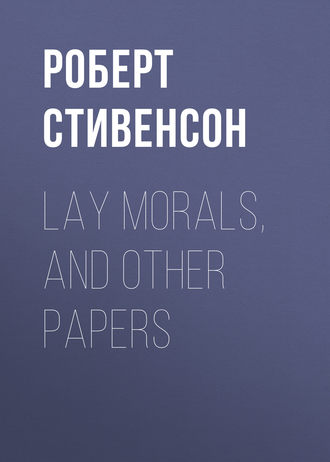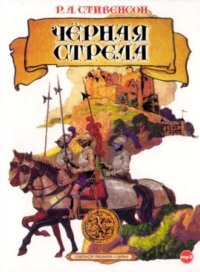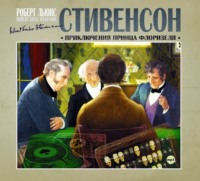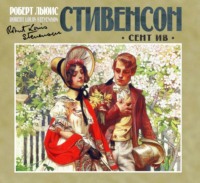 полная версия
полная версияLay Morals, and Other Papers
Next night they reached the village of Colinton, four miles from Edinburgh, where they halted for the last time. 18
CHAPTER IV – RULLION GREEN
‘From Covenanters with uplifted hands,From Remonstrators with associate bands,Good Lord, deliver us!’ Royalist Rhyme, Kirkton, p. 127.Late on the fourth night of November, exactly twenty-four days before Rullion Green, Richard and George Chaplain, merchants in Haddington, beheld four men, clad like West-country Whigamores, standing round some object on the ground. It was at the two-mile cross, and within that distance from their homes. At last, to their horror, they discovered that the recumbent figure was a livid corpse, swathed in a blood-stained winding-sheet. 19 Many thought that this apparition was a portent of the deaths connected with the Pentland Rising.
On the morning of Wednesday, the 28th of November 1666, they left Colinton and marched to Rullion Green. There they arrived about sunset. The position was a strong one. On the summit of a bare, heathery spur of the Pentlands are two hillocks, and between them lies a narrow band of flat marshy ground. On the highest of the two mounds – that nearest the Pentlands, and on the left hand of the main body – was the greater part of the cavalry, under Major Learmont; on the other Barscob and the Galloway gentlemen; and in the centre Colonel Wallace and the weak, half-armed infantry. Their position was further strengthened by the depth of the valley below, and the deep chasm-like course of the Rullion Burn.
The sun, going down behind the Pentlands, cast golden lights and blue shadows on their snow-clad summits, slanted obliquely into the rich plain before them, bathing with rosy splendour the leafless, snow-sprinkled trees, and fading gradually into shadow in the distance. To the south, too, they beheld a deep-shaded amphitheatre of heather and bracken; the course of the Esk, near Penicuik, winding about at the foot of its gorge; the broad, brown expanse of Maw Moss; and, fading into blue indistinctness in the south, the wild heath-clad Peeblesshire hills. In sooth, that scene was fair, and many a yearning glance was cast over that peaceful evening scene from the spot where the rebels awaited their defeat; and when the fight was over, many a noble fellow lifted his head from the blood-stained heather to strive with darkening eyeballs to behold that landscape, over which, as over his life and his cause, the shadows of night and of gloom were falling and thickening.
It was while waiting on this spot that the fear-inspiring cry was raised: ‘The enemy! Here come the enemy!’
Unwilling to believe their own doom – for our insurgents still hoped for success in some negotiations for peace which had been carried on at Colinton – they called out, ‘They are some of our own.’
‘They are too blacke’ (i. e. numerous), ‘fie! fie! for ground to draw up on,’ cried Wallace, fully realising the want of space for his men, and proving that it was not till after this time that his forces were finally arranged. 20
First of all the battle was commenced by fifty Royalist horse sent obliquely across the hill to attack the left wing of the rebels. An equal number of Learmont’s men met them, and, after a struggle, drove them back. The course of the Rullion Burn prevented almost all pursuit, and Wallace, on perceiving it, dispatched a body of foot to occupy both the burn and some ruined sheep-walls on the farther side.
Dalzell changed his position, and drew up his army at the foot of the hill, on the top of which were his foes. He then dispatched a mingled body of infantry and cavalry to attack Wallace’s outpost, but they also were driven back. A third charge produced a still more disastrous effect, for Dalzell had to check the pursuit of his men by a reinforcement.
These repeated checks bred a panic in the Lieutenant-General’s ranks, for several of his men flung down their arms. Urged by such fatal symptoms, and by the approaching night, he deployed his men, and closed in overwhelming numbers on the centre and right flank of the insurgent army. In the increasing twilight the burning matches of the firelocks, shimmering on barrel, halbert, and cuirass, lent to the approaching army a picturesque effect, like a huge, many-armed giant breathing flame into the darkness.
Placed on an overhanging hill, Welch and Semple cried aloud, ‘The God of Jacob! The God of Jacob!’ and prayed with uplifted hands for victory. 21
But still the Royalist troops closed in.
Captain John Paton was observed by Dalzell, who determined to capture him with his own hands. Accordingly he charged forward, presenting his pistols. Paton fired, but the balls hopped off Dalzell’s buff coat and fell into his boot. With the superstition peculiar to his age, the Nonconformist concluded that his adversary was rendered bullet-proof by enchantment, and, pulling some small silver coins from his pocket, charged his pistol therewith. Dalzell, seeing this, and supposing, it is likely, that Paton was putting in larger balls, hid behind his servant, who was killed. 22
Meantime the outposts were forced, and the army of Wallace was enveloped in the embrace of a hideous boa-constrictor – tightening, closing, crushing every semblance of life from the victim enclosed in his toils. The flanking parties of horse were forced in upon the centre, and though, as even Turner grants, they fought with desperation, a general flight was the result.
But when they fell there was none to sing their coronach or wail the death-wail over them. Those who sacrificed themselves for the peace, the liberty, and the religion of their fellow-countrymen, lay bleaching in the field of death for long, and when at last they were buried by charity, the peasants dug up their bodies, desecrated their graves, and cast them once more upon the open heath for the sorry value of their winding-sheets!
Inscription on stone at Rullion Green:
hereand near tothis place lyes thereverend mr john crookshankand mr andrew mccormickministers of the gospel andabout fifty other true covenantedpresbyterians who werekilled in this place in their owninocent self defence and deffenceof the covenantedwork of reformation bythomas dalzeel of binsupon the 28 of november1666. rev. 12. 11. erectedsept. 28 1738Back of stone:A Cloud of Witnesses lyes here,Who for Christ’s Interest did appear,For to restore true Liberty,O’erturnèd then by tyranny.And by proud Prelats who did RageAgainst the Lord’s Own heritage.They sacrificed were for the lawsOf Christ their king, his noble cause.These heroes fought with great renown;By falling got the Martyr’s crown. 23CHAPTER V – A RECORD OF BLOOD
‘They cut his hands ere he was dead,And after that struck of his head.His blood under the altar criesFor vengeance on Christ’s enemies.’ Epitaph on Tomb at Longcross of Clermont. 24Master Andrew Murray, an outed minister, residing in the Potterrow, on the morning after the defeat, heard the sounds of cheering and the march of many feet beneath his window. He gazed out. With colours flying, and with music sounding, Dalzell, victorious, entered Edinburgh. But his banners were dyed in blood, and a band of prisoners were marched within his ranks. The old man knew it all. That martial and triumphant strain was the death-knell of his friends and of their cause, the rust-hued spots upon the flags were the tokens of their courage and their death, and the prisoners were the miserable remnant spared from death in battle to die upon the scaffold. Poor old man! he had outlived all joy. Had he lived longer he would have seen increasing torment and increasing woe; he would have seen the clouds, then but gathering in mist, cast a more than midnight darkness over his native hills, and have fallen a victim to those bloody persecutions which, later, sent their red memorials to the sea by many a burn. By a merciful Providence all this was spared to him – he fell beneath the first blow; and ere four days had passed since Rullion Green, the aged minister of God was gathered to is fathers. 25
When Sharpe first heard of the rebellion, he applied to Sir Alexander Ramsay, the Provost, for soldiers to guard his house. Disliking their occupation, the soldiers gave him an ugly time of it. All the night through they kept up a continuous series of ‘alarms and incursions,’ ‘cries of “Stand!” “Give fire!”’ etc., which forced the prelate to flee to the Castle in the morning, hoping there to find the rest which was denied him at home. 26 Now, however, when all danger to himself was past, Sharpe came out in his true colours, and scant was the justice likely to be shown to the foes of Scottish Episcopacy when the Primate was by. The prisoners were lodged in Haddo’s Hole, a part of St. Giles’ Cathedral, where, by the kindness of Bishop Wishart, to his credit be it spoken, they were amply supplied with food. 27
Some people urged, in the Council, that the promise of quarter which had been given on the field of battle should protect the lives of the miserable men. Sir John Gilmoure, the greatest lawyer, gave no opinion – certainly a suggestive circumstance – but Lord Lee declared that this would not interfere with their legal trial, ‘so to bloody executions they went.’ 28 To the number of thirty they were condemned and executed; while two of them, Hugh M‘Kail, a young minister, and Neilson of Corsack, were tortured with the boots.
The goods of those who perished were confiscated, and their bodies were dismembered and distributed to different parts of the country; ‘the heads of Major M‘Culloch and the two Gordons,’ it was resolved, says Kirkton, ‘should be pitched on the gate of Kirkcudbright; the two Hamiltons and Strong’s head should be affixed at Hamilton, and Captain Arnot’s sett on the Watter Gate at Edinburgh. The armes of all the ten, because they hade with uplifted hands renewed the Covenant at Lanark, were sent to the people of that town to expiate that crime, by placing these arms on the top of the prison.’ 29 Among these was John Neilson, the Laird of Corsack, who saved Turner’s life at Dumfries; in return for which service Sir James attempted, though without success, to get the poor man reprieved. One of the condemned died of his wounds between the day of condemnation and the day of execution. ‘None of them,’ says Kirkton, ‘would save their life by taking the declaration and renouncing the Covenant, though it was offered to them… But never men died in Scotland so much lamented by the people, not only spectators, but those in the country. When Knockbreck and his brother were turned over, they clasped each other in their armes, and so endured the pangs of death. When Humphrey Colquhoun died, he spoke not like an ordinary citizen, but like a heavenly minister, relating his comfortable Christian experiences, and called for his Bible, and laid it on his wounded arm, and read John iii. 8, and spoke upon it to the admiration of all. But most of all, when Mr. M‘Kail died, there was such a lamentation as was never known in Scotland before; not one dry cheek upon all the street, or in all the numberless windows in the mercate place.’ 30
The following passage from this speech speaks for itself and its author:
‘Hereafter I will not talk with flesh and blood, nor think on the world’s consolations. Farewell to all my friends, whose company hath been refreshful to me in my pilgrimage. I have done with the light of the sun and the moon; welcome eternal light, eternal life, everlasting love, everlasting praise, everlasting glory. Praise to Him that sits upon the throne, and to the Lamb for ever! Bless the Lord, O my soul, that hath pardoned all my iniquities in the blood of His Son, and healed all my diseases. Bless Him, O all ye His angels that excel in strength, ye ministers of His that do His pleasure. Bless the Lord, O my soul!’ 31
After having ascended the gallows ladder he again broke forth in the following words of touching eloquence: ‘And now I leave off to speak any more to creatures, and begin my intercourse with God, which shall never be broken off. Farewell father and mother, friends and relations! Farewell the world and all delights! Farewell meat and drink! Farewell sun, moon, and stars! – Welcome God and Father! Welcome sweet Jesus Christ, the Mediator of the new covenant! Welcome blessed Spirit of grace and God of all consolation! Welcome glory! Welcome eternal life! Welcome Death!’ 32
At Glasgow, too, where some were executed, they caused the soldiers to beat the drums and blow the trumpets on their closing ears. Hideous refinement of revenge! Even the last words which drop from the lips of a dying man – words surely the most sincere and the most unbiassed which mortal mouth can utter – even these were looked upon as poisoned and as poisonous. ‘Drown their last accents,’ was the cry, ‘lest they should lead the crowd to take their part, or at the least to mourn their doom!’ 33 But, after all, perhaps it was more merciful than one would think – unintentionally so, of course; perhaps the storm of harsh and fiercely jubilant noises, the clanging of trumpets, the rattling of drums, and the hootings and jeerings of an unfeeling mob, which were the last they heard on earth, might, when the mortal fight was over, when the river of death was passed, add tenfold sweetness to the hymning of the angels, tenfold peacefulness to the shores which they had reached.
Not content with the cruelty of these executions, some even of the peasantry, though these were confined to the shire of Mid-Lothian, pursued, captured, plundered, and murdered the miserable fugitives who fell in their way. One strange story have we of these times of blood and persecution: Kirkton the historian and popular tradition tell us alike of a flame which often would arise from the grave, in a moss near Carnwath, of some of those poor rebels: of how it crept along the ground; of how it covered the house of their murderer; and of how it scared him with its lurid glare.
Hear Daniel Defoe: 34
‘If the poor people were by these insupportable violences made desperate, and driven to all the extremities of a wild despair, who can justly reflect on them when they read in the Word of God “That oppression makes a wise man mad”? And therefore were there no other original of the insurrection known by the name of the Rising of Pentland, it was nothing but what the intolerable oppressions of those times might have justified to all the world, nature having dictated to all people a right of defence when illegally and arbitrarily attacked in a manner not justifiable either by laws of nature, the laws of God, or the laws of the country.’
Bear this remonstrance of Defoe’s in mind, and though it is the fashion of the day to jeer and to mock, to execrate and to contemn, the noble band of Covenanters – though the bitter laugh at their old-world religious views, the curl of the lip at their merits, and the chilling silence on their bravery and their determination, are but too rife through all society – be charitable to what was evil and honest to what was good about the Pentland insurgents, who fought for life and liberty, for country and religion, on the 28th of November 1666, now just two hundred years ago.
Edinburgh, 28th November 1866.
THE DAY AFTER TO-MORROW
History is much decried; it is a tissue of errors, we are told, no doubt correctly; and rival historians expose each other’s blunders with gratification. Yet the worst historian has a clearer view of the period he studies than the best of us can hope to form of that in which we live. The obscurest epoch is to-day; and that for a thousand reasons of inchoate tendency, conflicting report, and sheer mass and multiplicity of experience; but chiefly, perhaps, by reason of an insidious shifting of landmarks. Parties and ideas continually move, but not by measurable marches on a stable course; the political soil itself steals forth by imperceptible degrees, like a travelling glacier, carrying on its bosom not only political parties but their flag-posts and cantonments; so that what appears to be an eternal city founded on hills is but a flying island of Laputa. It is for this reason in particular that we are all becoming Socialists without knowing it; by which I would not in the least refer to the acute case of Mr. Hyndman and his horn-blowing supporters, sounding their trumps of a Sunday within the walls of our individualist Jericho – but to the stealthy change that has come over the spirit of Englishmen and English legislation. A little while ago, and we were still for liberty; ‘crowd a few more thousands on the bench of Government,’ we seemed to cry; ‘keep her head direct on liberty, and we cannot help but come to port.’ This is over; laisser faire declines in favour; our legislation grows authoritative, grows philanthropical, bristles with new duties and new penalties, and casts a spawn of inspectors, who now begin, note-book in hand, to darken the face of England. It may be right or wrong, we are not trying that; but one thing it is beyond doubt: it is Socialism in action, and the strange thing is that we scarcely know it.
Liberty has served us a long while, and it may be time to seek new altars. Like all other principles, she has been proved to be self-exclusive in the long run. She has taken wages besides (like all other virtues) and dutifully served Mammon; so that many things we were accustomed to admire as the benefits of freedom and common to all were truly benefits of wealth, and took their value from our neighbours’ poverty. A few shocks of logic, a few disclosures (in the journalistic phrase) of what the freedom of manufacturers, landlords, or shipowners may imply for operatives, tenants, or seamen, and we not unnaturally begin to turn to that other pole of hope, beneficent tyranny. Freedom, to be desirable, involves kindness, wisdom, and all the virtues of the free; but the free man as we have seen him in action has been, as of yore, only the master of many helots; and the slaves are still ill-fed, ill-clad, ill-taught, ill-housed, insolently treated, and driven to their mines and workshops by the lash of famine. So much, in other men’s affairs, we have begun to see clearly; we have begun to despair of virtue in these other men, and from our seat in Parliament begin to discharge upon them, thick as arrows, the host of our inspectors. The landlord has long shaken his head over the manufacturer; those who do business on land have lost all trust in the virtues of the shipowner; the professions look askance upon the retail traders and have even started their co-operative stores to ruin them; and from out the smoke-wreaths of Birmingham a finger has begun to write upon the wall the condemnation of the landlord. Thus, piece by piece, do we condemn each other, and yet not perceive the conclusion, that our whole estate is somewhat damnable. Thus, piece by piece, each acting against his neighbour, each sawing away the branch on which some other interest is seated, do we apply in detail our Socialistic remedies, and yet not perceive that we are all labouring together to bring in Socialism at large. A tendency so stupid and so selfish is like to prove invincible; and if Socialism be at all a practicable rule of life, there is every chance that our grand-children will see the day and taste the pleasures of existence in something far liker an ant-heap than any previous human polity. And this not in the least because of the voice of Mr. Hyndman or the horns of his followers; but by the mere glacier movement of the political soil, bearing forward on its bosom, apparently undisturbed, the proud camps of Whig and Tory. If Mr. Hyndman were a man of keen humour, which is far from my conception of his character, he might rest from his troubling and look on: the walls of Jericho begin already to crumble and dissolve. That great servile war, the Armageddon of money and numbers, to which we looked forward when young, becomes more and more unlikely; and we may rather look to see a peaceable and blindfold evolution, the work of dull men immersed in political tactics and dead to political results.
The principal scene of this comedy lies, of course, in the House of Commons; it is there, besides, that the details of this new evolution (if it proceed) will fall to be decided; so that the state of Parliament is not only diagnostic of the present but fatefully prophetic of the future. Well, we all know what Parliament is, and we are all ashamed of it. We may pardon it some faults, indeed, on the ground of Irish obstruction – a bitter trial, which it supports with notable good humour. But the excuse is merely local; it cannot apply to similar bodies in America and France; and what are we to say of these? President Cleveland’s letter may serve as a picture of the one; a glance at almost any paper will convince us of the weakness of the other. Decay appears to have seized on the organ of popular government in every land; and this just at the moment when we begin to bring to it, as to an oracle of justice, the whole skein of our private affairs to be unravelled, and ask it, like a new Messiah, to take upon itself our frailties and play for us the part that should be played by our own virtues. For that, in few words, is the case. We cannot trust ourselves to behave with decency; we cannot trust our consciences; and the remedy proposed is to elect a round number of our neighbours, pretty much at random, and say to these: ‘Be ye our conscience; make laws so wise, and continue from year to year to administer them so wisely, that they shall save us from ourselves and make us righteous and happy, world without end. Amen.’ And who can look twice at the British Parliament and then seriously bring it such a task? I am not advancing this as an argument against Socialism: once again, nothing is further from my mind. There are great truths in Socialism, or no one, not even Mr. Hyndman, would be found to hold it; and if it came, and did one-tenth part of what it offers, I for one should make it welcome. But if it is to come, we may as well have some notion of what it will be like; and the first thing to grasp is that our new polity will be designed and administered (to put it courteously) with something short of inspiration. It will be made, or will grow, in a human parliament; and the one thing that will not very hugely change is human nature. The Anarchists think otherwise, from which it is only plain that they have not carried to the study of history the lamp of human sympathy.
Given, then, our new polity, with its new waggon-load of laws, what headmarks must we look for in the life? We chafe a good deal at that excellent thing, the income-tax, because it brings into our affairs the prying fingers, and exposes us to the tart words, of the official. The official, in all degrees, is already something of a terror to many of us. I would not willingly have to do with even a police-constable in any other spirit than that of kindness. I still remember in my dreams the eye-glass of a certain attaché at a certain embassy – an eyeglass that was a standing indignity to all on whom it looked; and my next most disagreeable remembrance is of a bracing, Republican postman in the city of San Francisco. I lived in that city among working folk, and what my neighbours accepted at the postman’s hands – nay, what I took from him myself – it is still distasteful to recall. The bourgeois, residing in the upper parts of society, has but few opportunities of tasting this peculiar bowl; but about the income-tax, as I have said, or perhaps about a patent, or in the halls of an embassy at the hands of my friend of the eye-glass, he occasionally sets his lips to it; and he may thus imagine (if he has that faculty of imagination, without which most faculties are void) how it tastes to his poorer neighbours, who must drain it to the dregs. In every contact with authority, with their employer, with the police, with the School Board officer, in the hospital, or in the workhouse, they have equally the occasion to appreciate the light-hearted civility of the man in office; and as an experimentalist in several out-of-the-way provinces of life, I may say it has but to be felt to be appreciated. Well, this golden age of which we are speaking will be the golden age of officials. In all our concerns it will be their beloved duty to meddle, with what tact, with what obliging words, analogy will aid us to imagine. It is likely these gentlemen will be periodically elected; they will therefore have their turn of being underneath, which does not always sweeten men’s conditions. The laws they will have to administer will be no clearer than those we know to-day, and the body which is to regulate their administration no wiser than the British Parliament. So that upon all hands we may look for a form of servitude most galling to the blood – servitude to many and changing masters, and for all the slights that accompany the rule of jack-in-office. And if the Socialistic programme be carried out with the least fulness, we shall have lost a thing, in most respects not much to be regretted, but as a moderator of oppression, a thing nearly invaluable – the newspaper. For the independent journal is a creature of capital and competition; it stands and falls with millionaires and railway bonds and all the abuses and glories of to-day; and as soon as the State has fairly taken its bent to authority and philanthropy, and laid the least touch on private property, the days of the independent journal are numbered. State railways may be good things and so may State bakeries; but a State newspaper will never be a very trenchant critic of the State officials.






